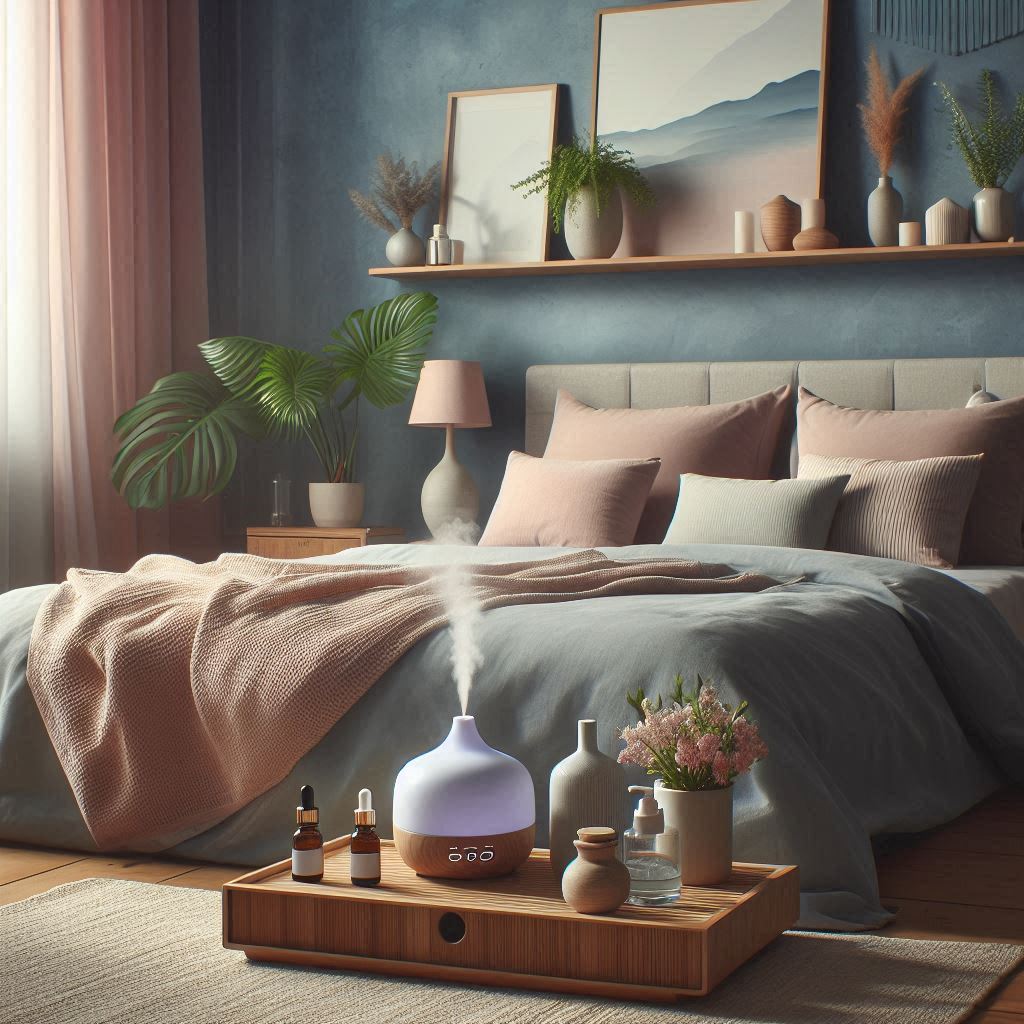
Picture this: You’ve had a day full of emails, meetings, and a family argument on the phone that left you drained. The world feels loud and heavy. Now, imagine walking into a room where the air is filled with the soothing aroma of Lavender and Sandalwood. Instantly, your shoulders relax, and the chaos starts to feel manageable.
Aromatherapy is more than just a luxury or a trend—it’s a bridge back to yourself. In an era where we’re overwhelmed with endless responsibilities and constant information, essential oils offer an anchor, a moment to pause and reset. Whether you’re battling stress, physical discomfort, or emotional turmoil, aromatherapy brings practical relief to the table.
Let’s dive into how aromatherapy supports modern living, with real-life scenarios and practical ways to incorporate it into your daily routine.
How Aromatherapy Supports Mental Wellness
Scenario:
You’re lying in bed at night, staring at the ceiling. Thoughts of old arguments and unresolved family trauma loop in your mind, refusing to let go. You try deep breathing, but the memories grip harder. Nights like this leave you exhausted and emotionally spent by morning.
The Solution:
This is where oils like Clary Sage and Neroli shine. Known for their calming and grounding effects, these oils help interrupt that mental cycle, creating space for relaxation and emotional release.
Practical Use:
Add 5 drops of Clary Sage and 3 drops of Neroli to your diffuser before bed. As the aroma fills your space, practice a guided meditation or simply breathe deeply. If diffusing isn’t an option, try adding a drop of Clary Sage to a carrier oil and massage it gently onto your wrists and temples.
What You’ll Notice:
After consistent use, many people find that the mental grip of stress and negative thoughts begins to loosen. You wake up not just rested but with a lighter emotional load.
Product Tie-In:
Explore House of Aja's handmade diffuser blends, which combines soothing oils like Chamomile and Bergamot to help create a tranquil environment.
Aromatherapy’s Physical Benefits: More Than Skin-Deep
Scenario:
The 3 p.m. slump hits hard, and your shoulders ache from being hunched over a desk all day. You’re tempted to reach for another cup of coffee, but you know it’ll only leave you jittery later. Or maybe, after an intense workout, your muscles feel so tight that even standing feels like a chore.
The Solution:
Instead of powering through or ignoring these physical cues, consider essential oils like Peppermint and Rosemary, which are both refreshing and anti-inflammatory. These oils don’t just smell invigorating—they actively help reduce tension and improve circulation.
Practical Use:
Create a DIY massage oil by combining 5 drops of Peppermint, 4 drops of Rosemary, and a tablespoon of Grapeseed oil. After work, massage this blend into your neck and shoulders to ease tension. Post-workout, use it on sore muscles to aid recovery.
Additional Tip:
Struggling with focus at work? Diffuse Rosemary near your workspace. Its crisp aroma boosts memory and mental clarity, helping you push through sluggish afternoons.
Product Tie-In:
Try House of Aja’s Wintergreen Eucalyptus Muscle Rub for a ready-made solution to muscle tension and aches.
Transforming Relationships Through Aromatherapy
Scenario:
You’re preparing for dinner with your partner, who’s been on edge all week. You want to talk, but you know their frustration might make them defensive. The atmosphere is already charged, and you feel the weight of walking on eggshells.
The Solution:
Aromatherapy isn’t just for self-care—it can change the energy in a room. Oils like Sweet Orange and Ylang Ylang create a welcoming, uplifting environment that encourages connection and positivity. Diffusing these oils before your partner arrives can set the stage for a calmer, more open interaction.
Practical Use:
Diffuse 6 drops of Sweet Orange and 3 drops of Ylang Ylang in your living room 20 minutes before your partner gets home. Pay attention not only to their mood but to your own—do you feel less tense, more prepared to communicate?
Experiment:
Over time, notice how consistent use of these oils influences the emotional tone of your household. Are conflicts diffused more easily? Are joyful moments amplified?
For more diffuser inspiration, check out our blog post on Diffuser Blends for Emotional Balance.
Addressing Common Questions About Aromatherapy
1. Is aromatherapy really effective?
Yes, studies show that the aromatic compounds in essential oils interact with the brain’s limbic system, influencing emotions, memory, and physical states like pain. It’s not just anecdotal—it’s science-backed.
2. What’s the safest way to use essential oils?
Always dilute oils with a carrier oil for topical use and avoid over-diffusing in small spaces. If you’re new to aromatherapy, start with gentle oils like Lavender or Sweet Orange, which are widely regarded as safe and effective.
3. How long before I see results?
Some benefits, like mood elevation, can happen instantly. Others, like improved sleep patterns or emotional balance, may require consistent use over weeks.
Aromatherapy is more than a wellness trend—it’s a practical tool for modern challenges. From calming racing thoughts and relieving physical tension to fostering positive relationships, essential oils help us reconnect with what truly matters: balance, health, and connection.

